This post has already been read 473 times!
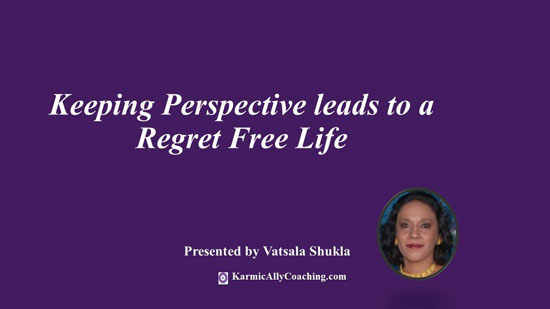
Keeping perspective when things don’t go the way you had expected them to be, are signs of self-awareness and more importantly self-management.
And to demonstrate high Emotional Intelligence, you have to have the ability to not only manage your pleasant emotions and feelings but also, your unpleasant ones.
In this video, we’re going to be looking at regret and on keeping perspective.
Prefer reading? Here’s the Transcript:
So, what is Regret?
In simple layman terms, Regret occurs when a person looks back at a past decision and wishes they had done something differently. If you want a more formal definition, then here’s one for you.
It’s an aversion or aversive emotion focused on the belief that some event from the past could have been changed in order to produce a more desirable outcome.
(Source: Roese NJ, Summerville A. What we regret most… and why. Pers Soc Psychol Bull. 2005;31(9):1273-1285. doi:10.1177/0146167205274693)
For example, these feelings can come up if you’re on a strict diet and then you go and binge on a bag of potato chips and wish you hadn’t done it. Or you hadn’t passed up a particular job offer in favour of another one and then discovered you were a cultural misfit.
It can get serious though and it can impact your career as well as your life if you’re not careful.
This is a real Quora Question which hinted at regret
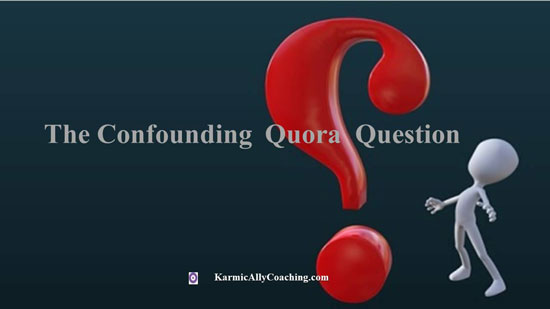
In fact, sometime back I had a question on Quora from somebody who asked me if it was okay to phone and shout at your manager after you’ve left an employment and telling them they were stupid.
Now I didn’t answer that question because I thought it was some sort of a hypothetical situation. I wasn’t going to waste my time on it.
But sometime later the same person asked another question about whether it would affect his career prospects if he called and shouted at his ex-manager.
Now when I saw that, I realized that perhaps he had actually gone and done it and THAT simply sounded like regret!
But on a more serious note, we do experience regret about missed opportunities, or past decisions, or losses.
And what concerns us the most in terms of our regrets, say some researchers, is our failure and our preoccupation with the mistakes we have made or for the things we ought to have done.
Now there are some more facts about Regret that I want to share with you.
In a Psychology Today article, they describe Regret as “an interesting and complex emotional process”.
It involved both thinking and feeling and since it does involve both, it is recognized or conceptualized as a “higher-order cognitive emotion”
In other words, it follows some other emotion’s activation. And that is exactly what might have happened back at Quora.
But unlike fear or anger, regret isn’t considered to be one of our core emotions. In fact, it is a blend of two or more primary emotions that are activated in close proximity, or results when one emotion is triggered in response to another.
The dominant emotions here, for regret are shame and sadness.
Regret is also a type of a counterfactual thinking, which involves imagining the ways your life might have gone differently. But no matter the severity, regret can cause terrible feelings of guilt, sadness, and ultimate depression.
When a person feels extreme feelings of regret, that anxiety can soon turn to anger or resentment. They may end up being so unhappy with their situation that they might take it out on others and creating even more problems for themselves.
Now as far as I’m concerned, although regret is a common emotion, it’s really a waste of time and energy.
And you may be asking me, why is that?
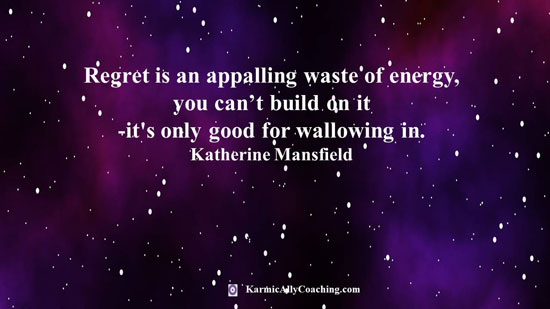
This quote from Katherine Mansfield is worth thinking about because those true sentiments do happen.
But you have to remember that you can’t go back in time and change your past decisions. Nor can you become someone else and avoid your current situation.
And wishing for a new outcome from impossible measures is actually a waste of time because it’s only going to cause you emotional and sometimes physical distress as well.
Now regret can play a negative role in our lives because we may be feeling extremely bad.
We may become extremely hard on ourselves; almost to the point of severe self-pity.
In addition to this, it’s also going to impact how we take our future decisions because you may be apprehensive due to past failings.
Because something didn’t work out in the past, like passing a driving test the first-time round because you didn’t take driving lessons, you may be scared to sit that exam again.
Now that is a simple example but the problem with this kind of mentality is that it actually impairs your ability to trust yourself.
And you continue to wallow in the past and you keep thinking about what could have been and what could not have been and really, you should be focusing on the future.
Also, when you’re basking in regret you are leaving yourself blind to the good in front of you. And actually indulging in more self-harm.
So, another thing that I wanted to tell you is that you have to always remember how much control you had in a situation.
You have to keep the perspective because while hindsight has 20:20 vision, you might not have had that information you have now back then. Perhaps at that point in time that may have been the best decision that was possible for you.
How to Handle Regret and adopt a Healthier Perspective
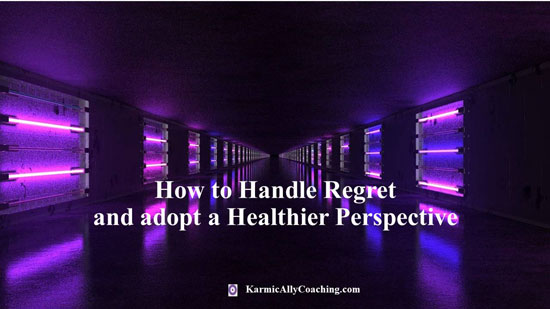
So keeping all of that in mind, let’s look at how you can handle regret and adopt a healthier perspective.
The first one is Acceptance.
Acceptance is the number one factor that is involved. You have to take into account that trying to change the past is impossible and will only result in frustrations.
Therefore, it is better that you take whatever loss you’ve had on the chin and moved forward.
The next one is to take responsibility for your actions and learn how to make better choices in the future.
Imagine all of the awesome things you could accomplish while you are sitting around wallowing in self-pity and mulling. Perhaps it is better to move on from the past and make better choices in the future. Let it be a learning lesson for you.
Also, make the best of a bad situation because once a decision is made, it is done. Instead of worrying about the past, it’s better to find something positive in the situation and try to do something about it. You could ask yourself the questions like,
- What can I do to make things better?
- How can I adjust my attitude to see the positive?
- What can I currently change?
Now when you ask yourself those kinds of questions, you are actually looking for the best you can do in the situation. This will change your overall negative dispositions into positive ones and motivate you to do better.
The next one is that you can ask yourself is it time to change course?
Because now that you have more information than you did in the past you are in a better position to decisions in the present and you can actually flip the switch on yourself and use it.
Use that situation which is causing regret to serve you better in the future. In other words, keep moving forward instead of staying stuck.
And more change your story or what we call don’t indulge in those fantasies that different choices would’ve yielded a far superior life. That’s why it’s helpful to rewrite this story that you’re telling yourself and focus on all the facts that your mind might have filtered out in order to validate your current story. In other words, build your positive reflex.
One suggestion I can give is that instead of doing the counterfactual looking up and doing fantasies, why not just look at how things could’ve been worse instead of how they could’ve been better.
It’s what we call “downward counterfactual”. In this way you can actually build your positive reflex.
Things could have been much worse. Maybe the choices could have resulted in different outcomes and not necessarily the ones that you’re thinking that would have.
Now all of this, trying to change this kind of negative things requires self-awareness. And self-awareness is the first step that you need to take in order to develop yourself and your emotional intelligence.
Only after that can you take a next step which is self-management.
And managing regret and using it for better purposes is part of that. And for that I have a simple self-study bundle where you’re getting both a guide to self-awareness and a workbook that you can use in order to develop this skill.
Final Words
My final words on the topic are that it is always possible that different choices would likely have brought different regrets.
You should count your blessings and learn your lessons. Identify and give yourself credit for the things you did right because you have done things right. Be honest with yourself!
Being able to overcome these feelings of regret can make you a stronger person. When you’re now embracing positivity as opposed to living in the past, it’s also good for your mental health.
One way to turn your regrets into an opportunity is to view the good that’s ensued. Have you grown as a person? Are you now mentally tougher?
Have you learned a valuable lesson? Because you have the power to not allow it to control you. Nobody else can do it, only you yourself.
By implementing positive thinking and focusing on the future, you will surely combat regret and live a life full of purpose.
This is Vatsala Shukla from Karmic Ally Coaching signing off. Here’s to your success. Bye for now.
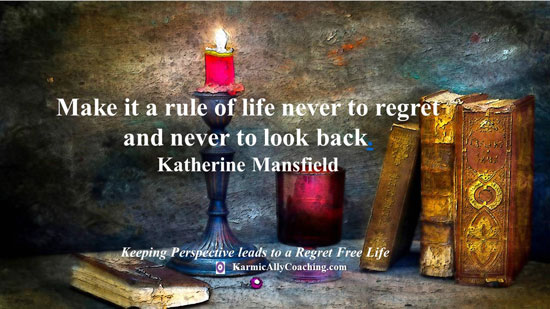


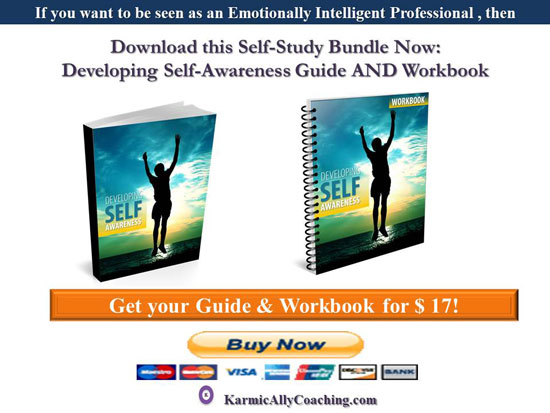

 I adhere to the Certified Coaches Alliance Code of Ethics and Standards. A copy is available on request.
I adhere to the Certified Coaches Alliance Code of Ethics and Standards. A copy is available on request.
 Let's Talk through the Connect Form:
Let's Talk through the Connect Form: